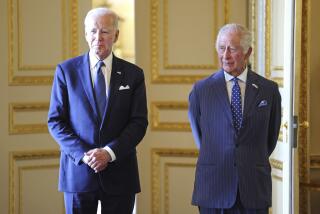Tripoli Can Show the Way
- Share via
A year ago, the picture of a Western leader greeting Libya’s decades-long terrorism sponsor with a friendly handshake and kind words would have seemed the product of a fever in the desert sun. But British Prime Minister Tony Blair’s hour of talks with Libyan dictator Moammar Kadafi outside Tripoli last month was no mirage; it was recognition that Kadafi is living up to a promise to rid the country of the weapons of mass destruction he spent so many years trying to develop.
Granted, the meeting would have been more appropriate at a different time. Blair a day earlier had attended the Madrid church service for the nearly 200 people killed in terror attacks on train stations. Neither Britain nor the U.S. can forget that it was Libya that killed 270 people by blowing up a Pan Am jetliner over Lockerbie, Scotland, in 1988, one of a series of terrorist attacks during Kadafi’s rule. Blair’s initiative otherwise made diplomatic good sense. Rewards should flow when rogue nations rejoin the international community and actually keep their pledges.
Despite its oil wealth, Libya is an economic shambles. Blair’s announcement that the Anglo-Dutch energy group Royal Dutch/Shell would spend at least $200 million on a liquefied natural gas project in Libya will be a boost. So will a deal to provide new civilian jets for the country. U.S. firms are lining up to do business with Tripoli after Washington lifts sanctions imposed in January 1986 because of Libya’s attacks a month earlier on the Rome and Vienna airports.
The Bush administration has lifted the ban on most travel by U.S. citizens to Libya, an appropriate first step. Last month, Washington reported “very substantial progress” by Tripoli in shutting down its programs to develop missiles and weapons of mass destruction. That includes U.S. and British inspection of Libyan facilities and removal of nuclear weapons components.
After Libya’s surprise announcement in December that it would end its chemical, biological and nuclear weapons programs, outside inspectors were welcomed. They discovered the pervasive reach of Pakistani nuclear scientist Abdul Qadeer Khan, who supplied nuclear know-how to Libya, North Korea and Iran. Pakistan, however, facing off against nuclear-armed neighbor India, is highly unlikely to consider giving up its nuclear program.
Iran may be more like Libya. It has no nuclear weapons yet, and the trade-offs for giving up its nuclear program -- world recognition and economic aid -- could be persuasive. Washington, London and their allies have carrots to offer Iran as well as sticks; they should extend both to get Tehran to stop concealing key elements of its nuclear program from international inspectors. Stopping nuclear proliferation should be the goal of every country. Having Kadafi preach that gospel will help.
More to Read
Sign up for Essential California
The most important California stories and recommendations in your inbox every morning.
You may occasionally receive promotional content from the Los Angeles Times.













